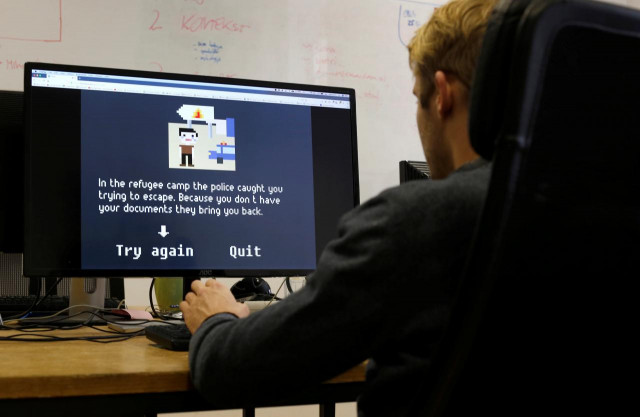Benin eyes video gaming in play for jobs and development
In 2018, the video games market was bigger than music and cinema, generating $138 billion worldwide

Slovenian NGO member plays a video game created to put players in the shoes of the migrants on the Balkan route and call the Slovenian government to remove the razor wire fence erected at the border between Slovenia and Croatia in Ljubljana, Slovenia.
PHOTO: REUTERS
At a large hotel in Cotonou, Benin held its first "hackathon" where participants were given just 24 hours to try to create a fun and educational video game for mobile phones.
"Socially, gaming is seen only as a distraction when it's a sector of the future," said organiser Tania Okanla, of the country's Digital Development Agency.
In 2018, the video games market was bigger than music and cinema, generating $138 billion (123 billion euros) worldwide, according to Newzoo, which specialises in data on the sector.
Heavy screen time appears to impact childrens’ brains
But Africa is estimated to represent just one per cent of that market, making it an area ripe for development and job creation.
Accountants PwC said in 2017 the value of Africa's video game industry would more than double to $642 million by 2021.
Sidick Bakayoko, president of the Benin Game Jam jury and organiser of the Electronic and Video Game Festival of Abidjan, wants to shine the spotlight on African talent.
"A few years ago, we were happy when we had 10 enthusiasts at a video game conference," he said. This year, there were more than 70 at the hackathon, including three women.
Those involved billed themselves as game designers, programmers and graphic artists.
Laurenda Agbo, 25, started playing on a console at a video club run by her father for just 25 CFA francs (4 US cents, 3 euro cents) a game.
Now she develops websites and games for mobile phones.
"When I found out there was a hackathon, I said, 'Wow, I'm going to be able to show what I can do'," she said.
Patrice de Souza likened himself to a "compulsive teenage gamer". He has already created a game based on a Beninese folk tale, which has been downloaded some 10,000 times.
"It's the chance to produce games about Africa, which go beyond the cliches and stereotypes we see in Western productions," he said.
"We've got a lot of things to say!" added the 25-year-old.
The hackathon jury seemed to have Beninese identity in mind.
Winners included a race across the country involving Dahomey Amazons, the female warriors of the ancient kingdom in modern-day Benin that lasted until the end of the 19th century.
Others included a game with the ubiquitous "zemidjans": motorbike-taxis that are found on every street corner.
Games were awarded prizes for the quality of the story, creativity and possible future development.
Talent may have been unearthed but exploiting it is the next challenge.
"It's with these young people that we're looking for the way to develop this sector," said the head of the Digital Development Agency, Serge Adjovi.
His colleague, Okanla, said the gaming revolution in Benin will take place on mobile telephones.
"Anyone can have one: 90 per cent of Beninese have got a mobile and it doesn't need very advanced technology, unlike games on a console or a PC," she added.
For developers, it's the private sector that is the most promising source of funding.
PS5 could be revealed as early as next year
"At the moment, there's a lack of investment to fund digital content in West Africa," said Robert Aouad, a hackathon partner and head of major internet service provider ISOCEL.
"We're all learning on our own," said web developer Steve Dakpogan, 31.
"Some of us run IT classes but we get our video gaming skills on the job."
A branch of a French IT school called Epitech opened in Cotonou in February and the Nantes School of Design aims to set up in the city.
All of which could help Benin prepare for entry into a very competitive sector.
Bakayoko is optimistic. "There's jobs galore and huge opportunities in video gaming. Africa has a part to play," he said.



















COMMENTS
Comments are moderated and generally will be posted if they are on-topic and not abusive.
For more information, please see our Comments FAQ